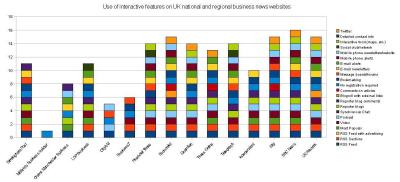I have been bad! Twelve whole days without a single post!
Would it surprise you that I can blame my lack of blogging entirely on… well… blogging?
Over the last two weeks I have been immersed in the creation and organisation of http://blogs.birminghampost.net. It has been a fantastic thing to get stuck into – if not a little hair-raising given the time schedule!
The brief has been to create a blog section for The Post that links into the sectors that we hope to cover. But, within that brief, there was quite a bit of flexibility. Would we just have staff writers? Would we ask for volunteers from outside of The Post? Would we have one blogger per sector, or more?
I had one big aim for the blogs – to get a bigger blogging presence in the West Midlands. My attention has been drawn to the BBC Manchester Blogs Project (thanks Craig and Francois), which includes guest bloggers (some who blog already, some who do not).
It’s an interesting and innovative approach and I like the way it draws people in and allows them to test the water. But, when some only post once and do not have their own blog, it seems to limit the conversation that can build up.
I also looked at some of the approaches that other newspapers have taken to blogging.
Many seem to have labelled blogs as online columns, choosing one or two people to be their “voices of authority”and sticking to them. It has always been an approach that has annoyed me, there’s something quite dictatorial about it.
Newspaper blogs that take this approach also often end up covering rather predictable topics which are probably more interesting to journalists than their readers: an editor spouting forth his wisdom in a “I know better than you” kind of way, a grumpy old man talking about how things aren’t as good as the old days… of course, I’m generalising here, but I think it’s a pattern others might recognise.
Another approach newspapers seem to take to blogs is to open them up to all their staff as an ultra-niche publishing platform for their interests. While many hobby blogs can be great, you can often end up with a collection of blogs that have nothing to do with anything else that appears on the newspaper’s website
So, I’ve been spending the last two weeks putting together a plan and doing a spot of recruiting both inside and outside of the paper. I wanted us to have a mix of experienced bloggers and complete beginners and I wanted them to be covering issues that loosely made sense within the context of The Post. Those who are completely new to the platform will be given help and guidance when and where they want it.
The response has been great… actually better than great. We have a mix of young and old from journalism, business, academia and the creative and cultural sectors. We’ve even had to start a waiting list!
I am under no illusions, however, that everyone who launches a blog with us will stick with it. Blogging is not for everyone, but I’d rather people had a go to see what worked for them. Because we want to keep things flexible for our first wave of Post bloggers, we’ve (hopefully) designed the blogs in a way that factors this in. If they post once or twice and never again, so be it, although I will be working very hard to get them as hooked as I am!
I hope too it’s something that can grow and change as it develops. If we have a demand for niche hobby bloggers, then we can cater for that, or if our site gains a substantial following for a particular topic, we can deal with that too.
Obviously I’ll be relying on you all to tell me what you think when we launch!

